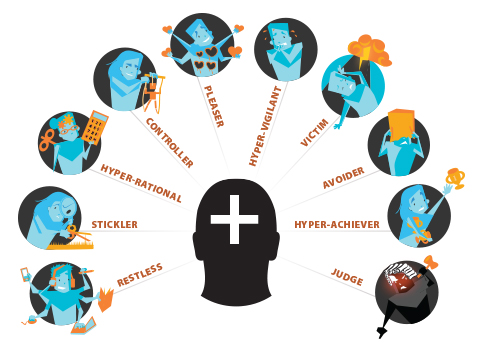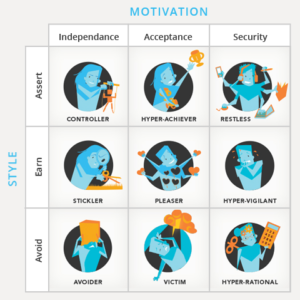Technology is the rabbit on the track that is making the greyhounds run faster and…

Positive Intelligence for Logistics Professionals
Positive Intelligence is a term coined by Shirzad Chamine and is the title of his best selling book. At the core, it describes your capacity for resilience and ability to handle life’s challenges with calm laser focus instead of being driven by negative emotion. Negative emotion, while a helpful signal that something needs to be addressed, tends to be a driver for behavior that actually sabotages the outcomes that you seek. According to Chamine’s research, individuals who have a high level of mental fitness tend to perform 31% better and have 37% more sales.
Having a high level of positive intelligence, or what Chamine refers to as PQ, relies heavily on both insight and mental muscle. Insight is another word for self awareness and many of us have much less of it than we think. In fact, according to a Harvard Business Review article in 2018
“95 percent of people think they are self-aware when 10-15% actually are” HBR, October 19, 2019
 Mental muscle, on the other hand, is the capacity to switch gears and not fall into behavior patterns that get you less, not more of what you truly want. Known as saboteurs, they come in 9 varieties. The chart on the right names the 9 saboteurs, what motivates their core behaviors, and in what way. Both self-awareness and a strong resilient mind help us to use our core strengths in a way that is focused and effective rather having a negative impact on our work, lives and relationships.
Mental muscle, on the other hand, is the capacity to switch gears and not fall into behavior patterns that get you less, not more of what you truly want. Known as saboteurs, they come in 9 varieties. The chart on the right names the 9 saboteurs, what motivates their core behaviors, and in what way. Both self-awareness and a strong resilient mind help us to use our core strengths in a way that is focused and effective rather having a negative impact on our work, lives and relationships.
How might each of these saboteurs show up in a logistics setting? While this list is not exhaustive, here are some possibilities:
Avoider: The avoider is the master procrastinator. He/she also tends to hold back important information hoping that critical matters will resolve themselves, especially if it means confronting someone or disrupting the peace and flow of things. Under high stress, there might be a tendency to hang out on the fringes hoping things will improve. In sales, there is a tendency to put off important calls.
Controller: The controller feels like if they don’t control the situation, things will either be out of control or they will be controlled. Under stress, there might be a doubling down on control and micromanaging rather than delegating or asking for other perspectives.
Hyper-achiever: Hyper-achievers tend to define themselves by their accomplishments. They are seldom at peace. There is a tendency to make others feel that they are inadequate because for the hypera-chiever, they have to “win” at everything. Sometimes their health and relationships suffer because of the constant need for top results. In logistics, a hyper-achiever may avoid taking necessary action in the face of stress and chaos because it may not result in an optimal result.
Hyper-rational- It is said that the hyper-rational tends to use only one channel in their brain, the one of data and logic. In logistics, this certainly seems impossible that there could ever be a downside to logic and data. However there are several. One is that relationships are necessary for teamwork, especially in times of stress. Another is that a hyper-rational can get hung up on micro data points that delay important action.
Hyper-vigilant: The hyper-vigilant saboteur is constantly on the lookout for the other shoe to drop. Not merely looking out for what could go wrong, all snafus and potential problems are weighted with equal concern. In logistics, a hyper-vigilant person may not know what requires immediate attention or how far up in the chain of command they need to go to to get something resolved. This is the classic Cry Wolf persona.
Pleaser: The pleaser is the good boss who everyone goes to because they are likely to cut them a break. In sales, they are the individual who continues to give large chunks of time to prospects that aren’t really prospects. Pleasers struggle with the worry that they might not be seen as nice.
Stickler: “I have to fix everyone else’s dumb mistakes.” The stickler is concerned with quality that is often a demand for perfection. The stickler is usually a great resource for how to do things right but many people may steer clear of them for fear of being ripped for missing something important or not knowing the answer to something.
Victim: The victim feels either uniquely flawed or feels like conditions, such as they are, make success impossible. So they stop looking for the doors that are actually open. Winston Churchill said, “Never waste a good crisis.” The victim presumes nothing can be done.
Much as been said about the severe impact and stress from COVID19 on health care, education, and first responders. I would add logistics and supply chain professionals to the list of those deeply impacted by the current conditions. Logistics and supply chain, from the top executives to the people trying to deliver items on time are also living with stress and great uncertainty. It is a prime set up for the saboteurs to be out in full force!
How do you slay the saboteur?
The remedy for slaying the saboteurs is first self-awareness. Go to the Positive Intelligence website and take the Saboteur Assessment . It’s a totally free assessment. Next schedule, a no-cost consultation with me and I will help you go over your results. You can go online to schedule your session here.
If you have further interest, I can describe the 6-week mental fitness bootcamp that I offer to individuals and groups that not only build the self-awareness I described in the article today but develop mental muscle to create sustainable changes.
Also tune into my podcast at the Logistics of Logistics where I discuss this topic and others, bringing the people development side to Logistics and Logistics sales.




This Post Has 0 Comments